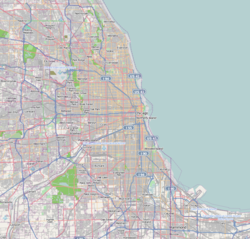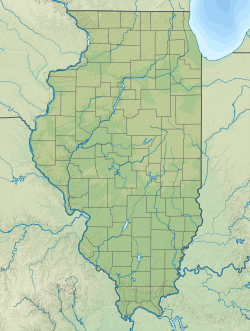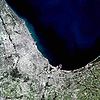Dixmoor, Illinois
Dixmoor, Illinois | |
|---|---|
| Motto(s): Faith and Restoration | |
 Location of Dixmoor in Cook County, Illinois. | |
| Coordinates: 41°37′51″N 87°39′59″W / 41.63083°N 87.66639°W | |
| Country | United States |
| State | Illinois |
| County | Cook |
| Township | Thornton |
| Incorporated | 1923 |
| Government | |
| • Type | Council–manager |
| • Mayor | Fitzgerald Roberts[1] |
| Area | |
• Total | 1.25 sq mi (3.23 km2) |
| • Land | 1.25 sq mi (3.23 km2) |
| • Water | 0.00 sq mi (0.00 km2) 0% |
| Population (2020) | |
• Total | 2,973 |
| • Density | 2,380.30/sq mi (919.38/km2) |
| Standard of living (2007-11) | |
| • Per capita income | $12,960 |
| • Median home value | $44,600 |
| ZIP code(s) | 60406, 60418, 60426 |
| Area code(s) | 708 |
| Geocode | 17-20149 |
| FIPS code | 17-20149 |
| Website | www |
Dixmoor (formerly Specialville) is a village in Cook County, Illinois, United States, and a south suburb of Chicago. The population was 2,973 at the 2020 census.[3] Dixmoor is adjacent to Harvey to the south and east, Posen to the west, and Blue Island and Riverdale to the north. Interstate 57 also runs through the village.
History
[edit]Dixmoor was originally called Specialville. It was laid out in 1922 by Charles Special, and named for him.[4] The present name of Dixmoor was adopted in 1929. It may be derived from Dixie Highway.[5]
Geography
[edit]Dixmoor is located at 41°37′51″N 87°39′59″W / 41.63083°N 87.66639°W (41.630784, -87.666446).[6]
According to the 2021 census gazetteer files, Dixmoor has a total area of 1.25 square miles (3.24 km2), all land.[7]
Surrounding areas
[edit]Demographics
[edit]| Census | Pop. | Note | %± |
|---|---|---|---|
| 1930 | 944 | — | |
| 1940 | 1,022 | 8.3% | |
| 1950 | 1,327 | 29.8% | |
| 1960 | 3,076 | 131.8% | |
| 1970 | 4,735 | 53.9% | |
| 1980 | 4,175 | −11.8% | |
| 1990 | 3,647 | −12.6% | |
| 2000 | 3,934 | 7.9% | |
| 2010 | 3,644 | −7.4% | |
| 2020 | 2,973 | −18.4% | |
| U.S. Decennial Census[8] 2010[9] 2020[10] | |||
As of the 2020 census[11] there were 2,973 people, 1,209 households, and 838 families residing in the village. The population density was 2,380.30 inhabitants per square mile (919.04/km2). There were 1,321 housing units at an average density of 1,057.65 per square mile (408.36/km2). The racial makeup of the village was 15.47% White, 50.92% African American, 1.58% Native American, 0.61% Asian, 0.07% Pacific Islander, 18.67% from other races, and 12.68% from two or more races. Hispanic or Latino of any race were 36.66% of the population.
There were 1,209 households, out of which 43.9% had children under the age of 18 living with them, 38.63% were married couples living together, 22.42% had a female householder with no husband present, and 30.69% were non-families. 29.36% of all households were made up of individuals, and 4.96% had someone living alone who was 65 years of age or older. The average household size was 3.72 and the average family size was 2.95.
The village's age distribution consisted of 26.7% under the age of 18, 10.4% from 18 to 24, 32.2% from 25 to 44, 20.3% from 45 to 64, and 10.4% who were 65 years of age or older. The median age was 29.9 years. For every 100 females, there were 85.7 males. For every 100 females age 18 and over, there were 86.9 males.
The median income for a household in the village was $44,757, and the median income for a family was $44,375. Males had a median income of $26,736 versus $15,552 for females. The per capita income for the village was $16,349. About 27.4% of families and 26.9% of the population were below the poverty line, including 40.5% of those under age 18 and 22.6% of those age 65 or over.
| Race / Ethnicity (NH = Non-Hispanic) | Pop 2000[12] | Pop 2010[9] | Pop 2020[10] | % 2000 | % 2010 | % 2020 |
|---|---|---|---|---|---|---|
| White (NH) | 933 | 405 | 310 | 23.72% | 11.11% | 10.43% |
| Black or African American (NH) | 2,224 | 1,907 | 1,485 | 56.53% | 52.33% | 49.95% |
| Native American or Alaska Native (NH) | 7 | 7 | 8 | 0.18% | 0.19% | 0.27% |
| Asian (NH) | 5 | 2 | 18 | 0.13% | 0.05% | 0.61% |
| Pacific Islander (NH) | 0 | 0 | 2 | 0.00% | 0.00% | 0.07% |
| Other race alone (NH) | 0 | 2 | 11 | 0.00% | 0.05% | 0.37% |
| Mixed race or Multiracial (NH) | 49 | 26 | 49 | 1.25% | 0.71% | 1.65% |
| Hispanic or Latino (any race) | 716 | 1,295 | 1,090 | 18.20% | 35.54% | 36.66% |
| Total | 3,934 | 3,644 | 2,973 | 100.00% | 100.00% | 100.00% |
Government
[edit]Dixmoor is divided between two congressional districts. The area east of Interstate 57 and south of 142nd Street is in Illinois's 2nd congressional district, as are the area between 141st and 142nd Streets east of Wood Street and the area northeast of the Ashland Avenue-Thornton Road intersection; the rest of the village is in the 1st district.
Transportation
[edit]Pace provides bus service on routes 349 and 354 connecting Dixmoor to destinations across the Southland.[13]
Notable people
[edit]- Tony Jacobs, pitcher for the Chicago Cubs and St. Louis Cardinals.
- Napoleon Harris, American politician and former American football linebacker who has been a member of the Illinois Senate representing the 15th district since 2013.
References
[edit]- ^ "Mayor". villageofdixmoor.org. Web.com Group, Inc. Retrieved February 20, 2019.
- ^ "2020 U.S. Gazetteer Files". United States Census Bureau. Retrieved March 15, 2022.
- ^ "Dixmoor village, Illinois, Illinois profile". United States Census Bureau. Retrieved January 24, 2022.
- ^ Callary, Edward (September 29, 2008). Place Names of Illinois. University of Illinois Press. p. 94. ISBN 978-0-252-09070-7.
- ^ "Dixmoor, IL". Encyclopedia of Chicago. Chicago Historical Society. Retrieved November 4, 2015.
- ^ "US Gazetteer files: 2010, 2000, and 1990". United States Census Bureau. February 12, 2011. Retrieved April 23, 2011.
- ^ "Gazetteer Files". Census.gov. United States Census Bureau. Retrieved June 29, 2022.
- ^ "Decennial Census of Population and Housing by Decades". US Census Bureau.
- ^ a b "P2 Hispanic or Latino, and Not Hispanic or Latino by Race – 2010: DEC Redistricting Data (PL 94-171) - Dixmoor village, Illinois". United States Census Bureau.
- ^ a b "P2 Hispanic or Latino, and Not Hispanic or Latino by Race – 2020: DEC Redistricting Data (PL 94-171) - Dixmoor village, Illinois". United States Census Bureau.
- ^ "Explore Census Data". data.census.gov. Retrieved June 28, 2022.
- ^ "P004: Hispanic or Latino, and Not Hispanic or Latino by Race – 2000: DEC Summary File 1 – Dixmoor village, Illinois". United States Census Bureau.
- ^ "RTA System Map" (PDF). Retrieved January 30, 2024.






